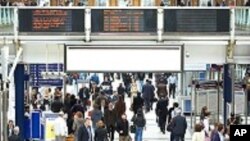The U.N. Habitat agency says more than half of the world's population lives in cities and that figure is expected to rise to more than 67 percent or around five billion people by the year 2030. The agency says more than 90 percent of the increase in urbanization will take place in developing countries, in particular in Asia and in emerging economies.
U.N. Habitat says there are at least 40 mega-cities with populations of 10 million or more, and that number is growing. It warns this is likely to be a recipe for disaster unless the needs of the urban poor are taken into account.
Senior Policy Advisor for U.N. Habitat in Geneva, George Deikun, says by 2030, more than three billion people or about 40 percent of the world's population will need housing and basic urban infrastructure and services.
"So, 1.6 billion people or about 25 percent of the world's population is living in slums, with some of the worst manifestations of poverty, deprivation and exclusion," Deikun said. "And, over 60 percent of people in African cities, Africa is about 40 percent urbanized, so 60 percent of the 40 percent or a quarter of all of Africa are living in slums. So, our belief is that the current approaches to planning must change to insure that planning contributes to sustainable urban development."
U.N. Habitat warns slums and informal settlements will grow as internally displaced people and refugees head for the cities. The agency says this will create competition for limited shelter, land, water, jobs, health and food. It notes this could lead to increased social tensions and violence between migrants and host populations.
Deikun says slums also have an increased vulnerability to natural disasters and complex emergencies.
"The loss of life and livelihoods due to cyclones, hurricanes, flooding among the urban poor, is, we think disproportionately higher because they live in higher risk areas," Deikun said. "Informal settlements are usually underserved with sanitation infrastructure. The structures that people live in and work in are more unsafe. There is a lack of water, sanitation and other basic services."
Deikun says there are also threats from climate change, particularly to low lying, coastal cities and the spread of epidemics in urban areas resulting from poor living conditions and overcrowding.
U.N. Habitat says better, more equitable urban planning is essential. It says all cities need safer and more environmentally friendly public transport, housing security, clinics and public services.
It stresses that planning will work only where there is good urban governance. It adds it is crucial the urban poor be made part of the decision-making process that affects their lives.
News
UN Habitat Agency Says Half of World Population Lives in Cities
update

<!-- IMAGE -->




